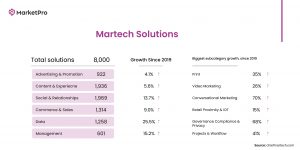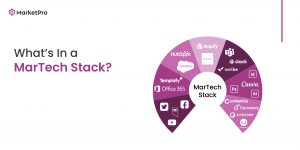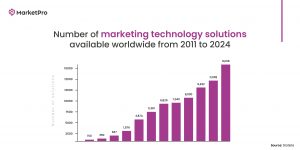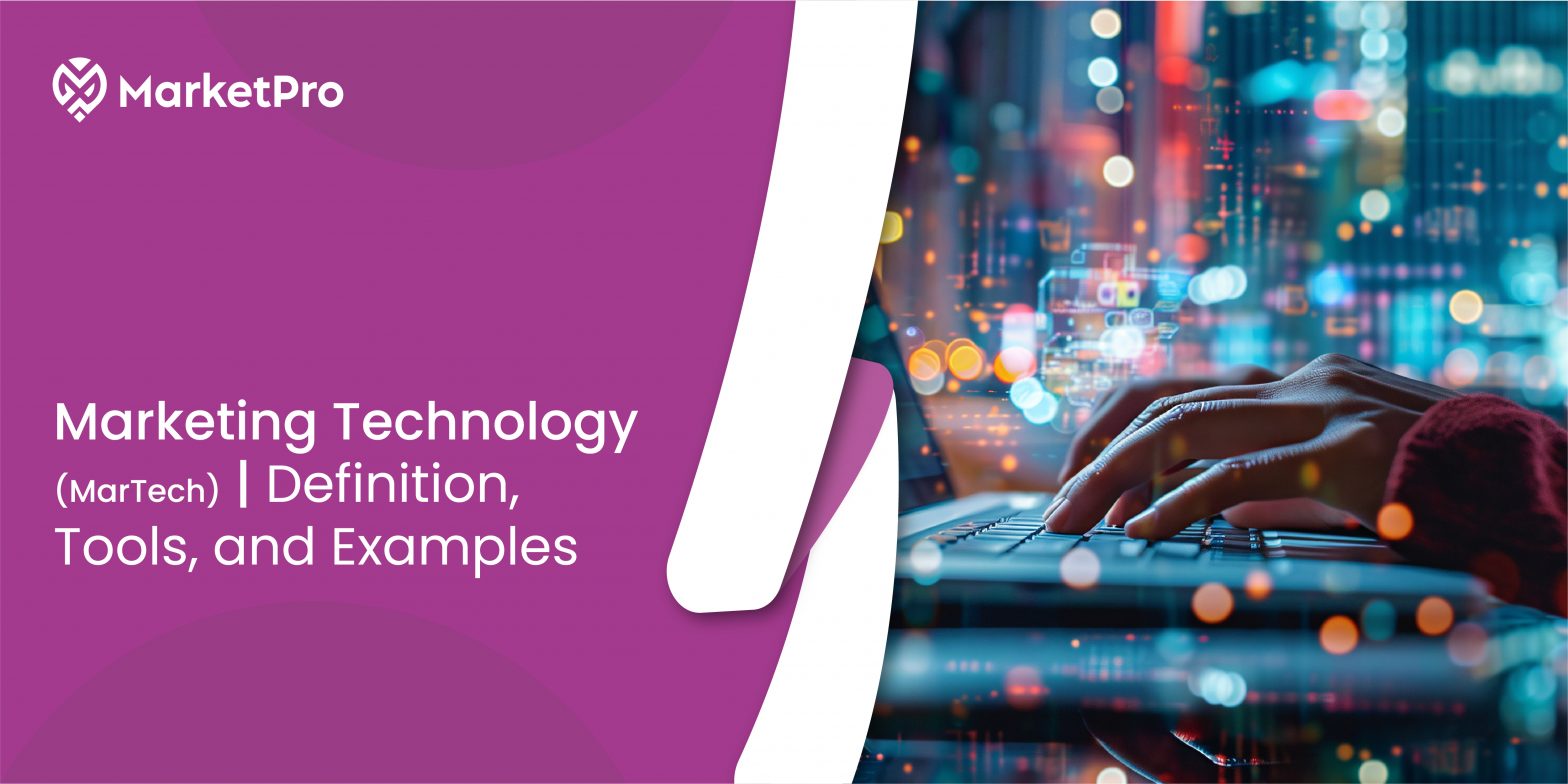Let’s be honest, businesses can no longer survive by manually guessing what their customers want or aiming to deliver a cohesive customer experience without consistently personalizing messages. They also cannot handle their siloed customer data without centralizing it for better targeting.
Wouldn’t it be amazing to have someone who could handle all these complex tasks with measurable tools and automation software, allowing you to focus on other business objectives?
Imagine having powerful marketing software that plans, executes, and measures marketing campaigns through exceptional technology—helping businesses escape manual scheduling for social media, email, and other channels, ultimately preventing costly downtime and securing sustainable budget allocations.
Well, it’s not some sugar-coated fantasy; Martech services are revolutionizing how businesses conduct marketing, and this blog will help you learn how to do yours.
What is Martech?
Marketing technology, or Martech, refers to the software and tools marketers use to streamline their marketing efforts. These tools ease marketers’ lives by providing automated market analysis, tracking, and workflow management that save time and improve the effectiveness of marketing campaigns.
Martech’s knack for understanding customer insights, handling customer segmentation, and hyper-personalization empowers marketers to plan and execute campaigns that provide consistent results.
Why is MarTech Important?
The global market for MarTech was worth $321.4 billion in 2021 and is expected to grow at an average annual rate of 8.15%, reaching $514.2 billion by 2027.
The rise of AI and the severe competitive nature of the marketing world has forced marketers to look for innovative solutions that promise to streamline their marketing results and free up their time to focus on other marketing objectives.

However, their presence is more prevalent in streamlining and easing marketing efforts. Another reason for their importance in today’s marketplace is their proficiency in strengthening the entire customer sales funnel. They achieve this by identifying weaknesses and making adjustments to enhance bottom-funnel results.
What Makes a Martech Stack?
A Martech stack is a set of software and tools companies use to plan, research, measure, and execute the performance of their digital marketing campaigns.
Did you know that, on average, a marketing organization uses an impressive 91 different tools in its marketing technology stack?

Martech is like an entire ecosystem of tools marketers use to manage and streamline their daily work activities. Each marketer uses relatable marketing tools from the organization’s martech stack and implements them to ease their individual tasks and roles.
A martech stack usually includes:
- Customer analytics tool
- Marketing automation
- Content creation and management
- Email service provider
- Advertising technology
- Social media management
- SEO
However, it’s not certain that every company uses the same martech stack. It completely depends on their market niche and target audience.
Essential Types of Marketing Technology
Now that we know what Martech does, its importance in the market, and how companies use it, let’s delve into different types of Martech solutions and how they help various individuals and departments within the organization.
Suggested Read: The Future of Fintech Marketing: Cementing Its Presence in the Digital Finance Realm
Email Marketing Software
Email marketing software helps businesses create and launch marketing campaigns with better stability and growth. The software can also build different email templates based on various segment audience lists and schedule their distribution.
Email Service Providers (ESP) like Mailchimp allow businesses to scale their marketing message volume with automated moderation and personalization in content.
Content Management Systems
CMS allows businesses to conduct their content marketing campaigns quickly and practically. It will enable marketers to change, update, and improve their website content, adding various features and tools to ease the work. Marketers leverage content management systems to build their websites and publish their blogs, images, and other web content in a way that engages with their customers.
Examples: WordPress, Joomla
SEO Tools
Search Engine Optimization (SEO) tools help businesses identify high-volume keywords in seconds. They provide all the elements, like blog titles and website headers, that allow companies to increase their site’s visibility and earn organic traffic at a more stable level.
Organic SEO software helps businesses rank their on-page content, monitors their backlink growth, assists in acing their keyword research, and more.
Examples: Hubspot, Ubersuggest, Semrush
Social Media Management
Modern marketing stacks also include social media management tools that create, schedule, and publish social media posts. These tools monitor growth metrics like engagement, responses, and customer interactions while maintaining and improving the growth of social media advertising.
Examples: Sensible, Hootsuite

Digital Advertising
Advertising technology, known as Adtech is also considered as a martech tool that advertisers use to handle their advertising on giant search engine platforms like Google.
Marketers use Adtech tools to conduct their remarketing campaigns and manage their different Google ad formats, such as search and display ads. They also use these tools to help track the performance of their digital ads and gain crucial insights into exploring and changing their targeting options to achieve optimal results.
Examples: AdRoll, Quantcast
Marketing Automation
A marketing automation platform is common software included in every organization’s martech stack. Marketing automation tools are not related to a single marketing niche. Instead, they adopt a multi-channel approach. Automation tools can create and launch email sequences based on audience segments and handle website chatbots.
They also automate content in social media posts, in-app text messaging and provide personalized automations based on customer attributes.
Examples: Salesforce, Omnisend
Analytics Platform
Analytics platforms act as guides for businesses that collect and monitor data, turning it into valuable pointers for companies to handle and improve their marketing efforts. This analytics software helps firms monitor their website traffic, campaign performance, and the number of leads they convert. These platforms provide valuable insights to businesses that get to know the performance of their overall marketing campaigns.
Examples: Google Analytics, Semrush
Martech Trends
Here are some of the current Martech trends:
- Rise of marketing data management roles – Data is becoming more crucial than ever. Businesses are collecting and managing their customer data to improve their marketing efforts. Besides managing data, businesses also need to secure and protect the privacy of their records. That’s why companies hire managers specifically to ensure data integrity, integration, and confidentiality to fulfill their marketing purposes.
- Demand for unified solutions – Typical mid-size businesses have many Martech solutions running under their organization. The rise of unifying their Martech stack into one unified solution is more essential than ever. Instead of handling and using different Martech platforms for their various marketing channel campaigns, a unified solution saves time by allowing businesses to avoid using separate platforms every time and enhance their interdepartmental collaborations.
- Rise of Artificial Intelligence and hyper-personalization – The rise of AI has taken the marketing and tech world by storm. AI is helping businesses understand and manage customer data and preferences in countless ways. It generates insights about customer actions, provides actionable recommendations, identifies loopholes in the customer sales funnel, and handles repetitive tasks. This allows marketers to focus on core activities. Personalizing campaigns based on real-time customer behavior and preferences and promptly addressing their needs. This has made AI a powerful trend in Martech solutions.
Scale Your Martech Growth With Market Pro Today
Martech services are helping businesses scale their growth with data-driven decisions and market analysis designed to produce measurable results. In today’s marketplace, there is no place for making big decisions based on intuition or instincts. With Martech’s influential use cases, businesses can save tons of time using automation and conducting in-depth research on their marketing campaigns.
With more than 60 martech solutions in our portfolio, Market Pro has all the advanced tools and expertise to drive transformational growth for your business.

